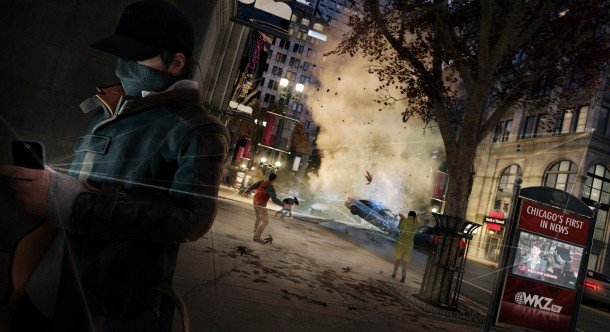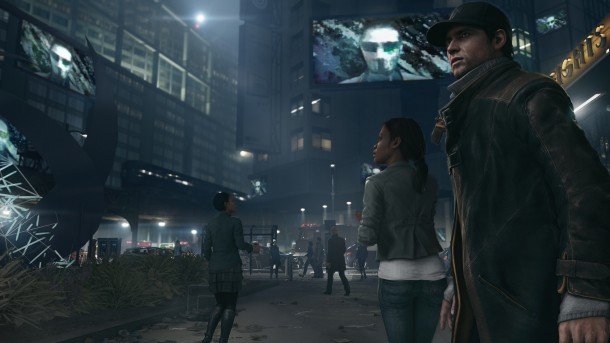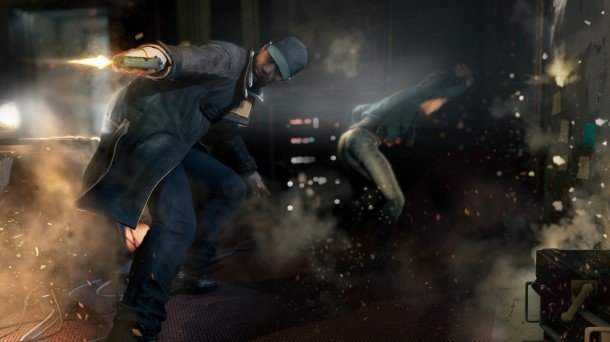Watch Dogs hands-on: the stealthy high road and the reckless low road

There's a trancey rhythm to Aiden Pearce's incognito shuffle that I don't want to break. He can run and vault, but in that heavy coat? It's got to be a swamp under there already, so instead of approaching my first obstacle with parkour and bullets, I skulk up to a chain link fence around one of virtua-Chicago's CtOS (Central Operating System) hubs, nonchalantly hack open a gate, and creep into the lot. I have the calmness of a t'ai chi master until I gracelessly duck into cover, out again, and back in.
Somewhere inside Ubisoft Montreal's twisty high-security labyrinth (I swear you can make four right turns and end up on a different floor), I'm finally playing Watch Dogs , and the cyber-thriller's inspiration is all around me: security cameras, card readers, and a chance of rain in the Very Serious city of Montreal.
Back in Chicago, I'm being more careful than I need to be. This is one of the easy ones—at least, it's less complex than Ubisoft's studio—but I'm timid as I sneak from crate to crate (all conveniently placed for the shootout I could be having) trying to guess at the guards' vision cones. It turns out the guards are nearsighted anyway, and short cover-to-cover dashes don't give me away. I easily find the security device I need to point my hacking phone at, and through what I'll just assume are magic eyeballs, I leave Aiden's body and enter a security camera inside the complex to infect the server. Then I backtrack until I'm strolling down a Chicago street, hands in pockets, all smug with power.

Mechanically, Watch Dogs is GTA-plus . GTA plus hacking. GTA plus stealth. GTA plus decent shooting. The developers seem exhausted by the comparison, but it's true: open-world urban games aren't required to have guns, car theft, police chases, a shady third-person male protagonist, or the same encouragement to be reckless that GTA thrives on.
At first, I don't want to be reckless. I steal my first car, pull up to a red light, and stop. My guide chuckles and tells me everyone does that—a hint that I really don't need to—so I shrug and turn onto the sidewalk.
The cars are fast and nearly indestructible, and laws are for babies. Driving my first car, I smash through traffic, using sidewalks as a lane when I need to, changing lights and raising concrete blockers with the one-button hacking while barely maintaining control as I shift between golf cart and drag racer. The motorcycles are insanely fast, and the only way I could white-line it through traffic as the motion blur stuck my hair back was to use the time-dilating focus button. I forgot about that feature a lot, and probably broke every rib in Aiden's body vaulting over parked cars.
All this, and not a peep from the police. Unless a pedestrian steps out in front of my ride of terror, I'm free play Fast and Furious all over Chicago. After handling the CtOS facility with such care, it feels off.
Keep up to date with the most important stories and the best deals, as picked by the PC Gamer team.

Watch Dogs has some GTA in its genes, but playing it doesn't feel like playing GTA. It's not satire and it's not silly. There's nothing funny about driving over pedestrians, or shooting into a crowd. I ghosted the CtOS facility because killing those guards didn't feel like something Aiden would do. Now I'm finally playing with my handgun, and when I pull it out the crowd reacts with fear. I point it at a civilian dialing 911, and they drop their phone, hands up. I could pull the trigger, but that doesn't seem fun.
Where GTA IV is populated by mass-produced cardboard people running on tracks, Watch Dogs feels much less like a carnival game. Even shooting the bad guys is a more affecting experience. I spot one outside Sears Tower (Aiden's CtOS access gives him special insight), chase him down, and shoot him in the back. Then I just stand there contemplating justice as he crumples into the sidewalk. I have to be told to use my disposable cellular jammer and hijack an escape car, which I do clumsily, giving the police enough time to spot me.
Escaping the cops is seriously hard. It's all about breaking line of sight with sharp turns, but my inexperience sends me drifting into sidewalks and dividers, plowing through pedestrians. Hacking helps: with my best maneuver I raise a draw bridge and sail across the widening gap— see ya, later, coppers! Unfortunately, I've just escaped the demo's border, too, and it's game over.
It turns out, though, that there isn't much punishment for being killed or captured anyway. The worst thing that will happen is that your reputation will lower, and people on the street will say nasty things about you, but it won't affect the story: there's only one ending regardless of how you play, though I'm told its meaning will be up for debate. I'm also told that the story can't be completed without using a gun, which is OK—it could be a useful narrative device—but I hope little else infringes on my preference to play a stealthy, low-key Aiden Pearce.
That's because when I was skulking around the CtOS facility, I was living in the world, immersed in all the little stories around me. I could have pulled out an assault rifle and murdered the guards, shrugging off the approaching sirens, but that would have stripped away the world's fidelity—to borrow a device from Assassin's Creed, it would have desynchronized my Aiden from the "real" Aiden in my head.
At the end of the demo, I was fully desynced, and I wasn't in Chicago anymore; I was in a sandbox, exploiting game rules to act like a maniac. The action was fast and exciting, but I found it less fun than stopping at red lights.
Watch Dogs releases November 19 in North America and November 22 in Europe. We'll have more on it—including multiplayer impressions and interviews—soon! In the meantime, keep track of all our Gamescom 2013 coverage .
Disclosure amendment: At the time I wrote this article, I was in a relationship with an employee of Ubisoft.

Tyler grew up in Silicon Valley during the '80s and '90s, playing games like Zork and Arkanoid on early PCs. He was later captivated by Myst, SimCity, Civilization, Command & Conquer, all the shooters they call "boomer shooters" now, and PS1 classic Bushido Blade (that's right: he had Bleem!). Tyler joined PC Gamer in 2011, and today he's focused on the site's news coverage. His hobbies include amateur boxing and adding to his 1,200-plus hours in Rocket League.

